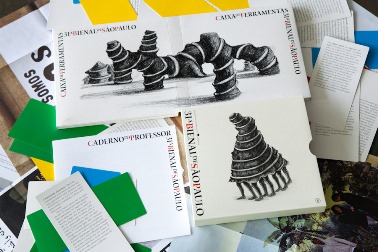
31st Bienal Toolbox brings visual identity with drawings by artist Prabhakar Pachpute
The educational material for the 31st Bienal consists of ten posters presenting participant artists or artist collectives, with background texts on their careers and the contexts of their activities, as well as forty ‘educational tips’, all designed as a group-work ‘tool kit’ focused through four conceptual lenses: collectivity, conflict, imagination, and transformation.
In addition to brokering the possibility of contact with the event, this material raises questions and themes of its own, capable of fuelling discussion and project work both inside and outside the classroom. ‘We want to involve people in a process of discovery and transformation in which art serves as a means toward creating unexpected possibilities for those willing to invest their time and energy in the experience’, explains a text by the curatorial team, formed by Charles Esche, Galit Eilat, Nuria Enguita Mayo, Oren Sagiv and Pablo Lafuente.
Collectivity and plurality are key questions in the discussions proposed by the educational material, which aims to broaden perception and underscore the fact that effective change (cultural, social, political) has to be collective if it is to take place at all.
According to the curators, the projects reveal attempts at approximation with artistic and cultural practices that are relevant to, and representative of, the general approach, and which can open doors to a set of problematics and ways of dealing with them. ‘They are about our present day, yet also heighten our capacity to understand different positions and behaviors’, says the text.
The artist-based projects presented in the material can be examined using the four broad conceptual tools, which do not only serve as interpretive lenses, but also as methodologies: collectivity, imagination, conflict and transformation. These lenses aim to shape different ways of seeing the projects and possible actions to be incorporated into them.
Devised by the Bienal Educativo and the curatorial team for the 31st Bienal, in conjunction with the other teams and departments that make up the Bienal de São Paulo Foundation, the educational material for this exhibition involved a new level of collaborative construction, in which teachers, educators, artists and guests invited by the Educativo Bienal helped develop the ‘tips’ in the tool box. Over thirty professionals took part in producing this content through a workshop held late in November 2013.
The educational tips are suggestions of practical actions that can be worked into class planning or inspire new ideas.
‘We managed to put together a group to create this material. It was a work of collective invention in which ideas circulated, triggering our desire to create as a team’, says the Bienal’s Educational Curator, Stela Barbieri.
The educational material for the 31st Bienal is ready for distribution to partner institutions and will be handed out at the training encounters scheduled throughout 2014 and at the exhibition itself. It is also available for download. *just in Portuguese language
